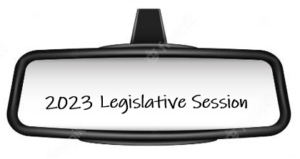by Jery Payne

As we head down the road towards the 2024 session, looking for a nice rest area with green grass and blue sky, the 2023 session is now in our rear view mirror, and although each session has its own special scenery, road curves, and interesting viewpoints, 2023 was quite a ride. Sometimes it felt like we were racing down an open highway, windows open with the wind blowing through our hair. And other times we waited in a traffic jam, peering out over the steering wheel to count the number of cars ahead, only to shrug our shoulders, turn up George Strait, and sing along, “And there’s a road, a winding road that never ends ….”
If this road hasn’t ended, at least we’re pulling into the motel for the night. The General Assembly has adjourned sine die. The regular session is done, and it’s time for some rest and relaxation.
Despite the long hours, the number of bills introduced is actually pretty normal. I count 617 bills introduced this session, which is about the same as the last few sessions: 657 bills were introduced in 2022, 623 bills in 2021, 651 bills in 2020, and 598 bills in 2019. But the number of bills doesn’t really tell the whole tale because the word bill can refer to a three-page bill or to a 300-page bill. This year did seem to have more of those longer complex bills than normal. But again, that doesn’t really tell the whole tale. The 2023 session felt long because it was a session with many long debates, which makes for long hours for legislators and staff.
The 2023’s regular session is done. Staff is still getting bills signed, writing digests, and getting the bills ready to go to the governor, who has to decide what he will do with these bills. If there are 10 days left in the session, the governor has 10 days to sign, veto, or ignore a bill. But if there aren’t 10 days left when the bill is presented, the governor has 30 days for those same options. If the governor signs a bill or ignores it for the required time, the bill becomes law. If the governor vetoes a bill, it does not become law and the governor must send it back to the House and the Senate with a letter explaining his reasons for vetoing the bill. Normally, the General Assembly can override a veto, but not if the General Assembly has adjourned sine die. (I suppose the General Assembly could call itself back for a special session to override the veto, but let’s hope that’s a road trip it does not take.)
For now, the legislative votes have been taken and we await the decisions of the governor.
Enjoy a bit of downtime, but the 2024 session is coming, so don’t wait too long.
Before you know it interim committees will be starting up. In addition to the existing committees, this year the General Assembly will be forming three additional interim committees: The Colorado’s Child Welfare System Interim Study Committee, the Recidivism Interim Study Committee, and the Legislative Interim Committee on Ozone Air Quality. The first two were created through the letter process, while the third was a product of House Bill 23-1294. So now enjoy your interim. We will be also enjoying our interim, and LegiSource is going on hiatus for the summer. But the 2024 session is coming. Today, the motel is calling you from the road, but tomorrow, the road will be calling you from the motel.
